National Bat Monitoring Programme Surveys
Find out which of our surveys are right for you and how to take part
The National Bat Monitoring Programme surveys are carefully designed so that anybody can take part in monitoring these fascinating
but easily overlooked mammals. As well as being of great value to bat conservation, the surveys are fun and rewarding to carry out.
They usually involve visiting a roost or potential foraging site on two evenings in the summer.
We run different surveys which cater to different levels of experience and knowledge.
Log in to take part in surveys and input and view your survey results online.
Please read our Privacy Policy before signing up. Please note that you need to be 16 or over to sign up to take part.
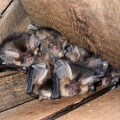 Online recording available
Online recording available
If you have bats in your property then you can help us by taking part in the Roost Counts. You count the numbers of bats emerging from roosts at sunset on two evenings during the summer survey period. The species we focus on are common and soprano pipistrelle, serotine (England/Wales only), Natterer's bat, brown long-eared bat, and lesser and greater horseshoe bat.
Find out more ...
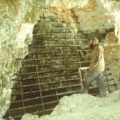 Online recording available
Online recording available
Bats are monitored over the winter months through our Hibernation Surveys. In this survey, experienced bat workers count bats in hibernation roosts in January and February each year.
Find out more ...
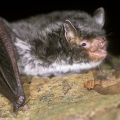 Online recording available
Online recording available
Help us find out how Daubenton’s bat populations are doing by taking part in the Waterway Survey. For this survey, you walk a route along a 1km stretch of water randomly allocated to you (this will always be close to where you live) on two evenings during August. You record Daubenton’s bat activity using a bat detector to listen to the bats and a torch to spot them flying over the water.
Find out more ...
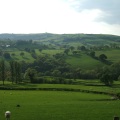 Online recording available
Online recording available
Use your knowledge of bat detecting by taking part in the Field Survey. For this survey, you are asked to design and walk a triangular route in a 1km square that we randomly allocate to you on two evenings in July. You will use a bat detector to record noctule, serotine, common pipistrelle and soprano pipistrelle bat activity (species you may encounter depends on where you live in the UK).
Find out more ...
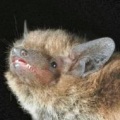 Online recording available
Online recording available
This project aims to determine the resident status, breeding status and migratory origins of Nathusius' pipistrelle in Great Britain. It involves bat detector surveys, trapping surveys and radio tracking.
Find out more ...
This project is aimed at bat groups and other natural history study groups. There are different options depending on the level of experience and equipment available in your group. Click
here for more details and to get involved.
 Online recording available
Online recording available
By taking part in the Sunset/Sunrise Survey you can find out about your local bats and help us find new bat roosts. Anyone can take part in this survey by looking for bats and their roosts in your garden or local green space. This survey takes place annually and you can take part anytime from April to September.
Find out more ...
This survey is aimed at beginners and you don’t need any previous bat experience to take part. It is an excellent way of contributing to the monitoring programme if you are new to bat surveying.
Click here to get more information, download a survey form and enter your results online.
This survey is funded by Natural England and focuses on monitoring barbastelles at sites designated as Special Areas of Conservation (SACs) due to the presence of this species.
Find out more ...

The survey involves making audio recordings from a broadband bat detector while walking a transect route. Previous experience is not essential but in order to take part you need to live within easy travelling distance of one of the barbastelle
SAC sites. We already have teams in place to survey these sites but if you are interested in assisting with these surveys then please
contact us.